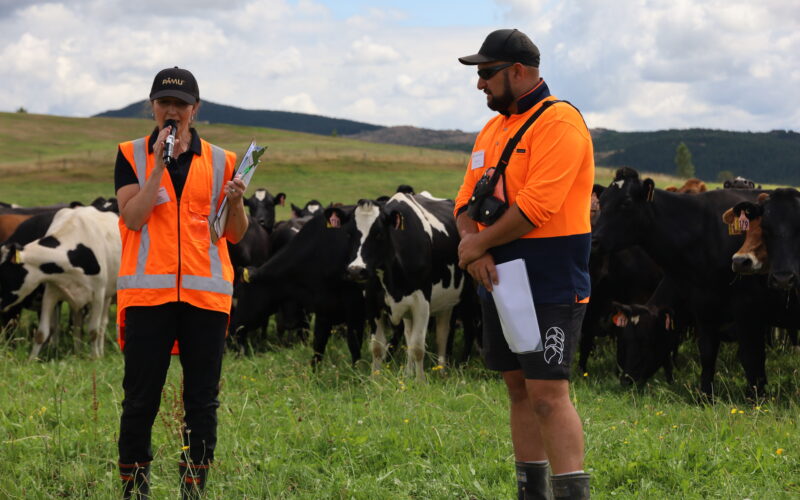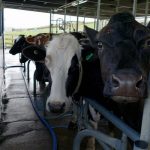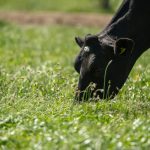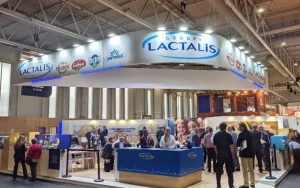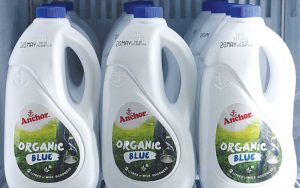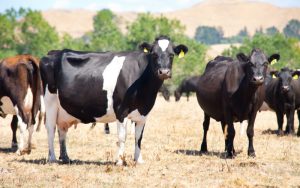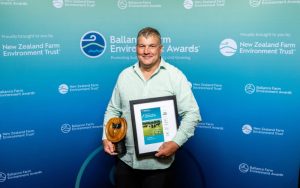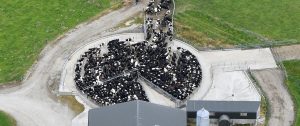
Eight years after it started converting dairy farms to organic systems, Pāmu is farming more profitably and more sustainably on those properties.
Pāmu has turned to organics to create a dairy farming system that is both profitable and has a smaller environmental footprint.
The state-owned farmer has 11 organic dairy farms in the North Island, in Wairākei north of Taupō and at Moutoa in the lower North Island.
Pāmu started converting farms to organics in 2016 in a staged progression in South Waikato and at Moutoa, Pāmu dairy business manager for organics Cleo Te Kiri said at an open day at Earnslaw, which is part of its cluster of farms at Wairākei.
The farm is a combined dairy farm and support block that is 675 effective hectares. It began its three-year certification process in 2016.
The farm has five centre pivot hectares, irrigating 232ha from water drawn from the Waikato River.
It peak milks 780 cows that are a mix of Jersey, Friesian and Kiwicross and is run by five full-time staff led by farm manager Scott Kupa.
The adjacent support block has 342 heifers and 190 heifer calves and is run by two staff.
“The reason we flagged farms here is that our organic farms are our irrigated farms and irrigated farms naturally have a high environmental footprint,” she said.
Pāmu was also aware of changing regulations in the form of the Waikato Regional Council’s Plan Change 1 and was aware of the high environmental footprint the farms had pre-conversion.
Te Kiri said the original intent was to create a farming system that was as profitable with a lower environmental footprint.
Pāmu had lowish expectations because of concerns around animal health, pasture management and what it would do for the farms’ financial performance.
“We did have a lot of reservations but we wanted to start the journey.”
By 2019, five more had been converted and at that stage, Pāmu took stock and got an independent review of the converted farms.
Baker Ag reviewed the farms and affirmed that Pāmu had made the right choice and could have increased profitability and lowered the environmental footprint, with many of its KPIs comparable to if not better than those on Pāmu’s conventional farms.
This did not mean the conversions were easy, she said.
“We were still learning and we spent a lot of time on other organic farms, talking to people and that reaffirmed how much we didn’t know and how we had to upskill ourselves with a whole heap of solutions because all of these tools had been taken out of our toolkit.”
One of the big challenges was around feed. Converting the land to be organically certified took three years, while it took animals just one year. The most practical way for Pāmu to change both was for it to convert its animals concurrently during that third year of conversion.
One of the rules it faced was restrictions around carrying feed over from one season to the next and this concerned it because it meant they could not use last season’s leftover feed if there was an issue, such as a drought.

Animal health was another area of concern, with Pāmu using drench, dry cow therapy and antibiotics. Converting to organics meant most of those either could not be used or had very limited use.
“It was a massive learning curve for us and it was a massive challenge to phase that out of our ‘normal approach’ to animal treatment.”
Te Kiri said it was not as scary as it had expected. Its organic farms had a 3.7% death rate last season compared to the average on Pāmu’s conventional farms of 4.5%.
This season has been more challenging as it faced mastitis and down cow issues, pushing that rate to 4.5%.
If a cow does require conventional treatment, it is transferred to one of Pāmu’s conventional farms.
She said one of the critical reasons for it success has been its staff. Everyone is committed to the organic philosophy of farming, and they have to be to make it work.
Another challenge was no longer drenching their younger stock.
“That was a really scary one for us.
“Obviously we had utilised antibiotics, dry cow therapy and drench in our conventional world and going to organics, those tools are completely gone from the toolkit or heavily restricted.”
Phasing those out was both a massive learning curve and challenge.
Te Kiri said the young stock performs exceptionally well and comparable to their peers on Pāmu’s conventionally run farms, if not better.
She puts that down to the attention to detail shown by the staff when it comes to stock management.
Earnslaw is consistently Pāmu’s top EBIT farm per hectare within its organic cluster, earning over $4000 a hectare.
Across the 11 farms, that EBIT is 30% higher than its conventional farms.
From a payout perspective over the past eight seasons, it delivers a $1.88/kg MS premium compared to the conventional payout. This has helped Pāmu deliver those higher EBITs.
The price also has less volatility than the conventional price, allowing Pāmu to plan better for the season, which is extremely valuable given the restrictions around organic farming, she said.
Earnslaw farm manager Scott Kupa said the farms focus on doing the basics well when it comes to feed management.
Data also plays a key role in decision-making around round lengths, cow condition and pasture covers, he said.
“Pasture management is a big focus for is. Because we run a System 1 system and all the feed is grown inside the farm gate, we have to manage our pasture really well.”
The farm’s 2IC plate walk’s the entire farm every Monday and then creates a grazing plan based on that data, he said.
Other challenges include finding solutions around no longer being able to use synthetic fertiliser, antibiotics for drying the cows off and weed control.
The farm’s pumice soils also presented a challenge around mining their fertility after just being converted from forestry.
Te Kiri said their goal is to replace the nutrients in the soil that are removed from milking and if there is a proven deficit, they will apply more than maintenance, which comes in the form of organically approved slow-release fertilisers as well as effluent.
Every farm is soil tested every five years and every year there is a transec that Pāmu follows.
Any fertiliser usage above maintenance is based on those results.
Looking ahead, Te Kiri said the stocking rate on the organic farms has fallen while the cost of production has gone up.
“We grow less grass and can feed fewer animals but we produce a more niche product which we will be paid more for.”
You can now read the most important #news on #eDairyNews #Whatsapp channels!!!
🇺🇸 eDairy News INGLÊS: https://whatsapp.com/channel/0029VaKsjzGDTkJyIN6hcP1K
